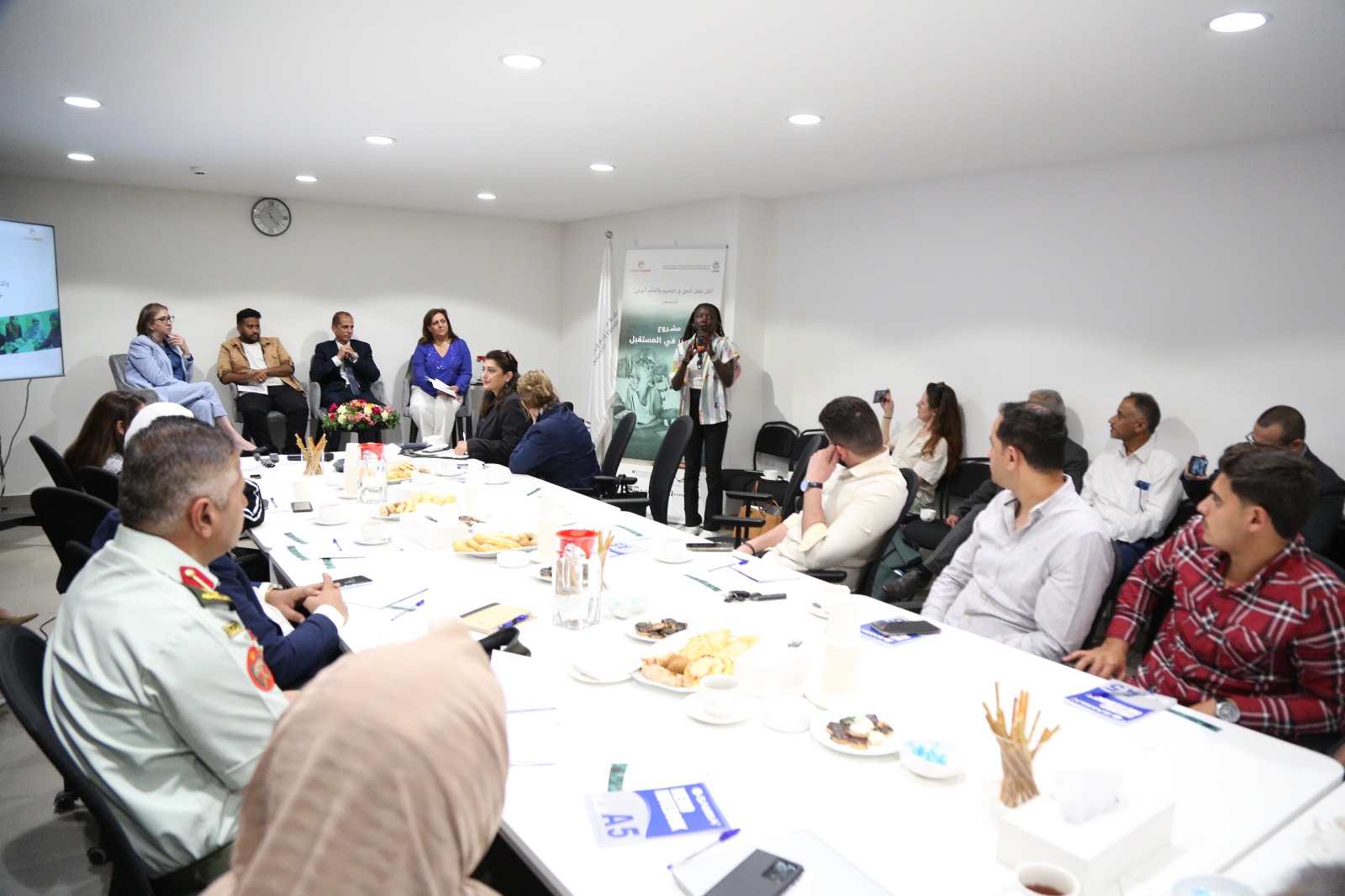according to the United Nations High Commissioner for Human Rights, there are about 13,000 Yemenis, 5,270 Sudanese, and some 598 Somalis living in Jordan as registered refugees, who suffer from systemic vulnerabilities ranging from health, education, protection, indebtedness, as well as food insecurity, among other problems.
Hence, and to ensure comprehensive, quality, and continuous education for refugees, the Arab Renaissance for Democracy and Development (ARDD) held, on Tuesday, June 13, 2023, a meeting to discuss the preliminary results of the survey conducted by the organization regarding the provision of technical and vocational education and training and opportunities thereof for Sudanese, Somalis, and Yemenis, within the framework of the National Alliance for the Future of Education in Jordan (NAFE), launched by ARDD in partnership with Vision Hope International.
The meeting included a panel discussion moderated by the Advisor to the Education Program at ARDD, Dr. Aseel Shawareb, on the main messages of the coordinated advocacy strategy for educational opportunities, where she indicated that the alliance’s strategy will work to combine a participatory approach that starts from the bottom up, to achieve the interventions required to develop the education sector, within the project to improve the livelihoods and education of minority refugee groups within society in Jordan, “Investing in the Future”, funded by the German Federal Ministry for Economic Cooperation and Development, which focuses on providing Quality education for all, raising awareness of opportunities for citizens, migrants, and refugees, supporting vocational education programs, and providing students with basic knowledge and life skills.
For his part, Head of the Department of Policy and International Cooperation at the National Corporation for Employment and Training, Dr. Zaid Al-Qaisi, stressed the need to enhance digital knowledge among graduates, refugees, and trainees alike, pointing out that the National Institution seeks to provide young people with multiple and diverse technical and administrative skills and accredited certificates, where young people can find an opportunity to refine their skills and practical knowledge to speed up the process of obtaining jobs. At the same time, undergoing these trainings would help in developing their capabilities, skills, experience, and even starting their own entrepreneurial projects in the future.
CEO of Al-Khwarizmi Technical University College, Suzan Qaddoumi, said that it is important to provide training grants with equal access for all, pointing out that the college offers programs with foreign-funded grants as well as in-house grants, but she also believes that it is necessary to think more comprehensively in terms of developing, providing, and evaluating trainings targeted at refugees.
Meanwhile, Abdullah Hashi, a 24-year-old Somali expert in e-marketing and one of the participants in the “Investing in the Future Project”, reviewed the most prominent challenges he faces in his daily life in Jordan, starting with his inability to work and obtain better opportunities to earn a living, and the lack of access to services and care, to the problems faced by refugees in Jordan, whether those are related to limited material assistance or lack thereof.
Sudanese athletics champion Abeer Ishaq agrees with Hashi, stressing the need to eliminate discriminatory views of them based on race, in light of the uncertainty of what the future holds for them, and other problems of accommodation, lack of support, and grants to pursue their education.
Another look at the results of the survey shows that the issue of high fees is a major obstacle to refugees’ access to TVET programs, and there are not enough scholarships by donors and the Jordanian government dedicated to refugee and asylum-seeking communities, in addition to the fact that public TVET institutions do not have policies related to the sensitive reality of refugees.
The survey also pointed out that few of these institutions have experience in making their educational programs and services available for refugees and asylum seekers, explaining that the providers of these trainings from non-governmental organizations have greater policies on the sensitivity of the reality of refugees in their dealings with these communities.
The survey showed that foreign languages, information technology, and mechanics constitute the top three programs sought by asylum seekers, while men constitute the vast majority in the various fields of TVET, and they are more oriented towards mechanical and technical design, building and construction, and cooking, while women prefer training and work in the field of foreign languages, psychotherapy, social work, and the beauty sector.
Furthermore, the survey emphasized that Jordan needs a strong and high-quality TVET system to enhance skills for the labor market and increase the efficiency and productivity of the workforce, and that skills and education must be accessible to everyone in Jordan, including poor Jordanians and refugees, with the need to facilitate costs and provide legal access to these trainings.
In conclusion, it is important to spread the culture of Jordanian TVET periodically and continuously, support the work of civil society organizations and the Jordanian government to promote public perceptions in this context, and have a unified approach of giving priority to refugees for donors, as well as involving the Jordanian authorities in talks related to enhancing access to livelihood opportunities for all refugees, in order to encourage transparency regarding TVET fees by private institutions.
As a next step, we need more voices, independence, and diversity of work. It is also necessary to have improved referral systems between CSOs and TVET providers, and periodic information campaigns on the subject. In addition, there’s a need to document experiences from the perspective of the recipient (students) and the service provider (selected institutions) by engaging the trainees in the conversation in order to learn and benefit from their experience in this program.


